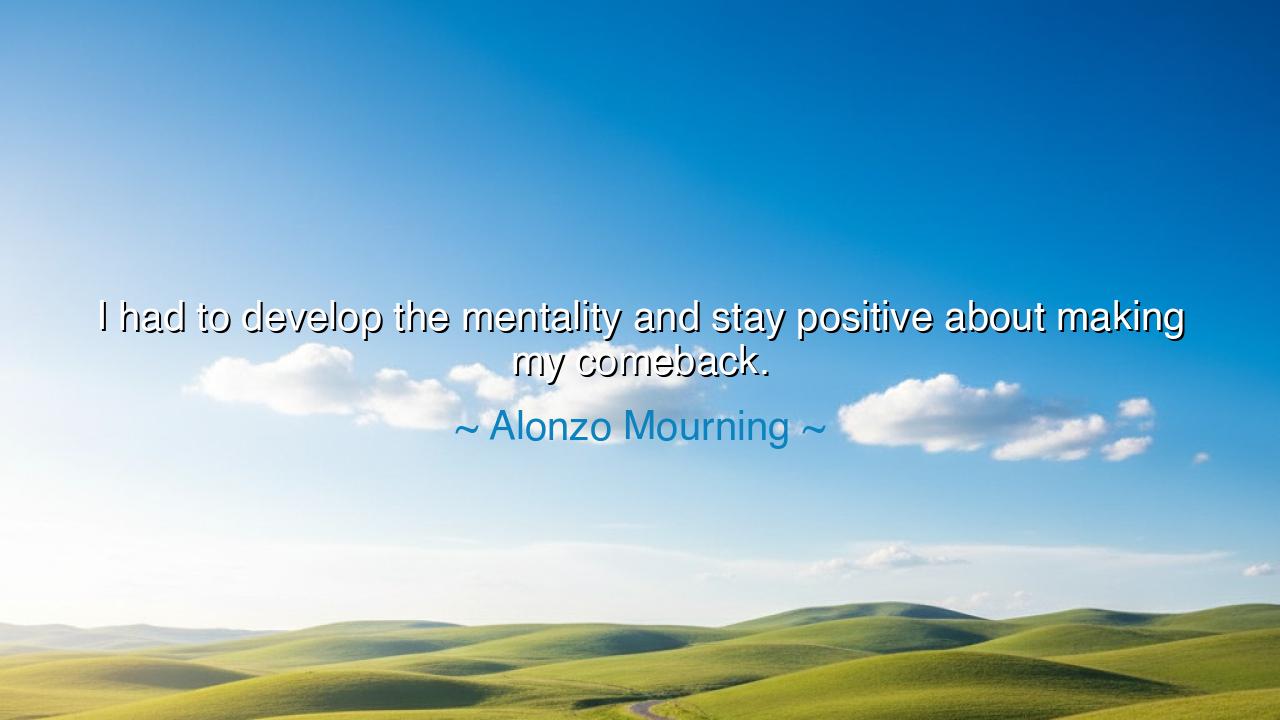
I had to develop the mentality and stay positive about making my






When Alonzo Mourning declared, “I had to develop the mentality and stay positive about making my comeback,” he spoke not only as an athlete, but as a warrior who had faced the brink of defeat and refused to be conquered. His words carry the weight of one who has walked through pain, illness, and despair, yet chose to cultivate a mentality of strength and resilience. For it is not the body alone that triumphs in times of trial, but the spirit, sharpened by positivity, that forges a path back into the light.
The ancients knew this truth. The gladiator stepping into the arena did not rely solely on muscle or skill, but on a mind set like steel, unbroken even in the face of death. The philosophers taught the same: Epictetus, once enslaved, declared that though his body could be bound, his mind could never be chained. Mourning’s words echo this timeless wisdom — that the true battlefield lies within, and that to endure and rise again requires an unshakable mental discipline.
Mourning’s life itself is a testament to this. Struck down by a life-threatening kidney disease in the midst of his career, he might have accepted the end of his journey. Yet instead of surrendering, he trained his mind to embrace hope, to focus on what could be rather than what had been lost. Through surgery, recovery, and relentless determination, he returned to the game he loved — a comeback not only of body, but of spirit. His triumph reminds us that positivity is not naive dreaming, but fuel for perseverance.
History offers us other luminous examples. Consider Nelson Mandela, who endured twenty-seven years in prison. Each day could have drowned him in bitterness, but he cultivated a mentality of resilience, keeping his heart fixed on freedom and reconciliation. When at last he emerged, his comeback was not just personal, but national, transforming the fate of South Africa. Like Mourning, he shows us that positivity amid despair is the seed of victory.
At the heart of this teaching lies the law of transformation: hardship is inevitable, but whether it destroys or strengthens us depends on the mind we bring to it. A broken body may heal or fail, but a broken spirit yields nothing. To stay positive is to declare that pain will not have the final word, that defeat is not the end of the story. It is to hold fast to the vision of a comeback, even when the world doubts it possible.
The lesson is clear: when life casts you down, do not surrender to despair. Instead, cultivate the inner fortress of mentality, and guard it with hope. Whether your comeback is from illness, failure, or heartbreak, remember that your strength lies not only in circumstance, but in the positivity you choose to carry. This choice will shape your path more than the trial itself.
In practice, this means training the mind as rigorously as the body. Begin each day with affirmations of strength. When setbacks come, focus not on what is lost but on what remains. Surround yourself with companions who feed hope rather than despair. And take small steps toward your comeback, knowing that each act of discipline builds the spirit that will carry you through.
Therefore, let us remember Alonzo Mourning’s wisdom: a comeback begins in the mind. To develop the mentality, to stay positive, to believe in the possibility of rising again — this is the way to victory. For though the world may strike you down, it cannot defeat the one who refuses to let go of hope. And in this, every soul has the power to rise anew.






HKHoang Khanh
I’m struck by the emphasis on mindset here and wonder how much preparation went into it behind the scenes. Did Mourning have mentors, coaches, or psychologists guiding him, or was this more self-driven? It also makes me question how we measure the effectiveness of a positive mentality—does it translate directly into performance, or is it more about sustaining motivation over time? Finally, how does this kind of mental discipline interact with natural talent and skill?
Hhongminh
This statement resonates deeply with anyone who has faced adversity. It makes me think about the role of self-talk and perspective in overcoming obstacles. Was Mourning able to maintain optimism even during setbacks, or did he have to consciously retrain his thinking? Also, what lessons can everyday people draw from this approach to resilience, particularly in non-sporting contexts like career challenges or health struggles? Can this mentality be intentionally developed?
APtuan anh phan
Reading this, I feel a strong sense of resilience and determination. It raises the question of how much of a comeback is mental versus physical. Could someone with less natural talent still achieve similar results if they cultivated the same mindset? I also wonder if there were external pressures, such as expectations from fans or teammates, that made staying positive even more challenging. How do elite athletes balance these pressures with internal motivation?
HDNguyen Vu Hoai Duong
I find this perspective incredibly inspiring. It makes me wonder what specific mental practices or routines Mourning used to maintain such a positive mindset during his comeback. Did he rely on visualization, meditation, or perhaps a support network? I'm also curious about the moments of doubt he may have faced and how he overcame them. How applicable is this mentality outside of sports, for someone recovering from personal or professional setbacks?